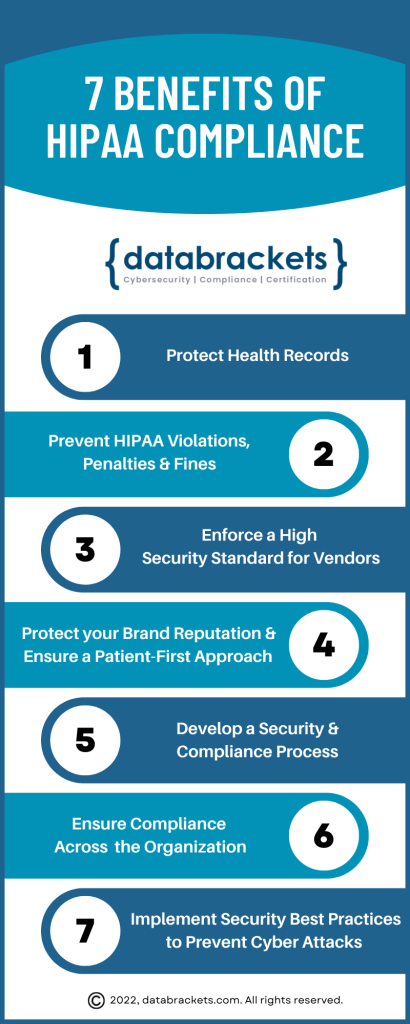
The Health Insurance Portability and Accountability Act of 1996 (HIPAA) outlines the rules and regulations with regard to the use and disclosure of Protected Health Information (PHI) by all businesses in the Healthcare industry. The Department of Health and Human Services (HHS) regulates HIPAA Compliance while the Office for Civil Rights (OCR) enforces it.
HIPAA Compliance is very beneficial for patients since it ensures their personal and identifiable information is protected from known and potential channels used for cyber-attacks. However, there are several benefits for HIPAA-compliant organizations as well. Some of the numerous advantages for Healthcare Providers, Business Associates, and Subcontractors are listed below.
1. Protect Health Records
HIPAA acts as a benchmark checklist for businesses that work directly or indirectly with Protected Health Information (PHI). It helps them plan a cumulative approach to security and data privacy. The Act equips the Healthcare industry and its allied businesses with the information they need to protect PHI from known, predictable, and potential channels and sources of cyber-attacks. The emphasis on annual staff training and preparation for an unannounced HIPAA audit ensures that businesses stay alert at all times.
2. Prevent HIPAA Violations, Penalties & Fines
Adherence to HIPAA rules helps Healthcare Providers, Business Associates and Subcontractors to prevent HIPAA violations. Since a HIPAA violation leads to fines and jail time, being HIPAA compliant ensures they can protect their organization, personnel, and brand reputation.
3. Enforce a High Security Standard for Vendors
HIPAA compliance is mandatory across the Healthcare delivery ecosystem. This includes mandatory protection of PHI according to HIPAA rules by Business Associates, Subcontractors, and any vendor, even if they have access to only a few elements of PHI like diagnostic images associated with a patient ID. While this may not seem like identifiable information to us, it is a gold mine for hackers, who find ways to locate the personal information associated with the patient ID from other sources.
4. Protect your Brand Reputation & Ensure a Patient-First Approach
Being HIPAA compliant is mandatory not only for Healthcare providers but also for their Business Associates and Subcontractors. This ensures that a patient-first approach is adopted across the Healthcare delivery ecosystem. Since HIPAA is mandatory, an organization’s brand reputation is damaged if they are penalized by the HHS. In order to retain the trust of patients, B2B customers and their brand reputation, it is critical for organizations to evaluate their level of HIPAA compliance regularly.
5. Develop a Security and Compliance Process
Adherence to HIPAA requires regular maintenance of security protocols, with particular emphasis on the security rule and the physical and technical safeguards outlined under it. This is achieved by developing an IT compliance process to review if all the safeguards are in place. Developing this process is beneficial as it allows organizations to detect deviations faster and take corrective actions to prevent a cyber-attack.
6. Ensure Compliance across the Organization
HIPAA mandates specific actions from the IT department and all stakeholders since its rules, amendments, and regular updates from the OCR ensure that compliance is a shared responsibility. The Act is mandatory for all businesses in the Healthcare Industry. As a result, businesses that are HIPAA compliant are protected from known sources / channels of data breaches. This ensures that ignorance of security protocols does not accidentally result in a vulnerability / loophole in the system.
7. Implement Security Best Practices to Prevent Cyber Attacks
The OCR has a subscription service to share security best practices with organizations and regular updates about the security measures that need to be updated. This helps organizations to stay informed and implement them.
If you have any questions about HIPAA compliance and would like to connect with a HIPAA Expert, please contact us for a free consultation. If you are looking for a convenient Do-It-Yourself HIPAA Attestation Kit, you can sign up for a free trial.
Related Links: